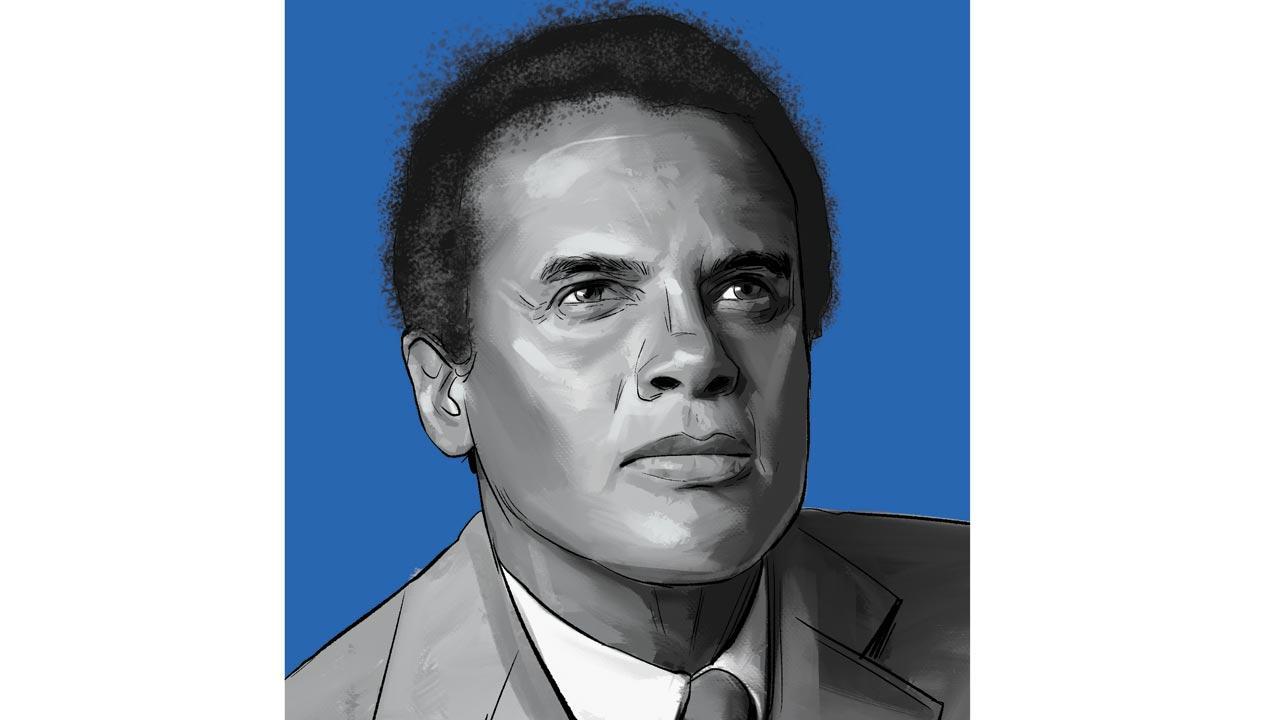In an interview with radio show host Terry Gross, Bellafonte says, “Paul Robeson once said to me, get people to sing your song—then they’ll be required to know who you are”

Illustration/Uday Mohite
![]() The reasons Harry Bellafonte, one of the 20th century’s most iconic artistes was so well-known and loved in India are historical—his film Calypso was a huge hit here. The liberal left related to his political activism in the American civil rights movement and his songs that reflected their idealistic concerns in those years, also helped popularise him.
The reasons Harry Bellafonte, one of the 20th century’s most iconic artistes was so well-known and loved in India are historical—his film Calypso was a huge hit here. The liberal left related to his political activism in the American civil rights movement and his songs that reflected their idealistic concerns in those years, also helped popularise him.
Indeed it is this association with Martin Luther King and the movement that is often used to describe his significance. But to hear Bellafonte’s own account of his life is to understand at a much deeper level what made him an artiste many embraced.
In an interview with radio show host Terry Gross, Bellafonte says, “Paul Robeson once said to me, get people to sing your song—then they’ll be required to know who you are.”
Robeson talks about working as an assistant janitor and receiving theatre tickets from a woman he worked for. His first visit to the theatre left him spellbound. “I saw people of colour on a stage articulating a point of view on a subject. And I found it quite magical. I saw people in motion doing things that were very positive and very creative… I became totally involved. They were getting ready to set up the next play and I pitched in to help take down the sets. I didn’t start off wanting to be a performer, I started off just wanting to be involved.”
More than ideology, it is this particular quality of being involved, to follow the body’s cerebral intuition, whether responding to art or to social reality is the place of our political transformation as people. Similarly, when Belafonte returned from the war, he found a deep hypocrisy around him. The US had propagandised to the world about ending fascism, racial superiority and anti-Semitism, and “making the world perfect for a meaningful future”. To find that racism remained riven into American society propelled him to insist on holding his society to those principles. “I decided that that’s what I would do as an artiste and as a human being and as a person.”
It is the same sense of openness and confidence that infuses his description of his voice and his art. In theatre he learned about the Brecht and Sartre, Shakespeare and Tolstoy and the span and intensity of these ideas gave him a “love and comfort” with being an actor. But as a black man, work was scarce in the theatre and he began singing to pay his way through university. He spent much time listening to other singers and musicians.
Bellafonte had a tilted larynx which gave his voice an unusual texture. But “when I heard people like Walter Huston sing, who had a gruffy voice, and when I listened to other singers, I was confident that I could move comfortably in the world of art and be accepted for what I was”.
To arrive at this kind of self-love and self-belief through art is a rare kind of confidence, one that can move us to great transformations, which makes courage a kind of beautiful grace and embrace. It is much of this luminous thought that transmits itself when we hear an artiste like Harry Bellafonte, letting us know who he is when we sing his songs, telling us who else we could be, as only the arts can.
Paromita Vohra is an award-winning Mumbai-based filmmaker, writer and curator working with fiction and non-fiction. Reach her at paromita.vohra@mid-day.com
 Subscribe today by clicking the link and stay updated with the latest news!" Click here!
Subscribe today by clicking the link and stay updated with the latest news!" Click here!








